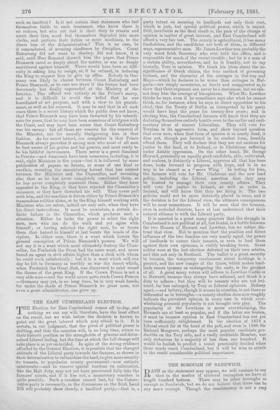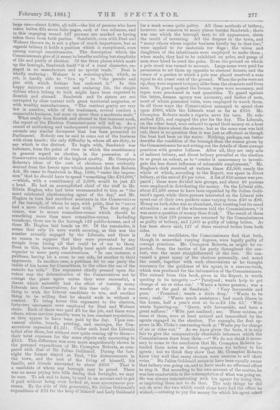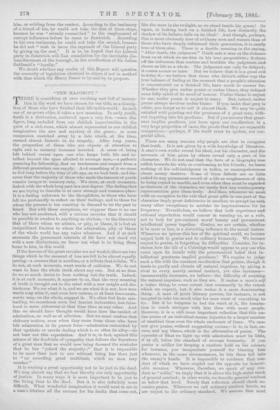THE BOROUGH OF SANDWICH.
RASH as the statement may appear, we will venture to say thst in the matter of electoral corruption we have at length touched bottom. There may be other boroughs as corrupt as Sandwich, but we do not believe that there can be any moi e corrupt. Though the constituency is not a very
large one—about 2,000, all told—the list of persons who have taken bribes fills seven folio pages, each of two columns, and in this engaging record 127 persons are marked as having taken them from both parties. Sandwich, even with Deal and Weimer thrown in, is not a place of much importance, but as regards bribery it holds a position which is exceptional, even among corrupt constituencies. The description which the Commissioners give of it seems to breathe nothing but simplicity of life and purity of election. Of the three places which make up the borough, Sandwich itself "is of a rural character, en- gaged in no manufacture and no special trade." Deal is wholly seafaring ; Weimer is a watering-place, which, as yet, is hardly able to "live up" to "the parade and pier with which fortune has endowed it." In this happy mixture of country and seafaring life, the simple virtues which belong to both might have been expected to flourish and abound. Sandwich and its sisters are not corrupted by close contact with great territorial magnates, or with wealthy manufacturers. "The resident gentry are very few in number, while of the tradesmen, several conduct a respectable business, but none on more than a moderate scale."
What really does flourish and abound in this innocent nook, the report of the Election Commissioners will tell us. As a record of unblushing and unchequered corruption, their report exceeds any similar document that has been presented to Parliament. Nobody can be said to come out of the business with clean hands ; the only difficulty is, where all are dirty, to say which is the dirtiest. To begin with, Sandwich was fortunate, from the point of view in which the constituency in general regard an election, in the possession of a Conservative candidate of the highest quality. Mr. Crompton Roberts's ideas of the cost of elections were evidently derived from the heroic ages which preceded the first Reform Act. He came to Sandwich in May, 1880, "under the impres- sion" that he should have to spend "something like £10,000," —which, with a constituency of 2,000, would be just £5 a head. He had an accomplished chief of the staff in Mr. Edwin Hughes, who had been recommended to him as "the most celebrated electioneering agent of the day," and Mr. Hughes in turn had excellent assistants in the Conservatives of the borough, of whom he says, with pride, that he "never had a more obedient set to deal with." The first step, of course, was to secure committee-rooms which should be something more than mere committee-rooms. Including' beershops, there are in the borough 142 public-houses, and of these Mr. Hughes laid hands on 89. Of the remainder, it seems that only 34 were worth securing, as this was the number actually engaged by the Liberals, and there is no reason to suppose that they were prevented by any scruple from hiring all that could be of use to them. Even in this, however, the kindly local spirit showed itself superior to mere party considerations. "In one instance, a publican, having let a room to one side, let another to their opponents. In another case, a publican let to one party the inside of his house for Committees, to the other the use of the outside for bills." The argument chiefly pressed upon the voters was the determination of the Conservatives not to conte,st the place again unless they were successful, a threat which naturally had the effect of turning many
Liberals into Conservatives, for this time only. It is one thing to wish the Liberal candidate to win, and another thing to be willing that he should walk in without a contest. To bring home this argument to the electors, forty-two canvassers were employed for Deal and Weimer alone. Each of these was paid £6 for the job, and there were others, whose services possibly were in less constant requisition, as they, appear to have been paid by the day. Upon can- vassers clerks, boards, printing, and carriages, the Con- servatives expended £1,321. Under each head the Liberals toiled after them, but without ever quite coming up to them— their total .expenses for the same objects only amounting to £615. This difference was even more magnificently shown in the personal expenditure of Mr. Crompton Roberts, as com- pared with that of Sir Julian Goldsmid. During the fort- night the former stayed at Deal, "his disbursements in the town, and the cost of the living of himself, his family, and friends amounted to about £650." That is a candidate of whom any borough may be proud. There was no mean prying into bills during that fortnight, we may be sure. To ask and to have, to send in an account and to get it paid without being even looked at, were synonymous pro- cesses. By the side of this generosity, Sir Julian Goldsmid's expenditure of £33 for the keep of himself and Lady Goldsmid
for a week seems quite paltry. All these methods of bribery, however, are common to many places besides Sandwich ; there was one which the borough may, to all appearance, claim the credit of inventing. All the drapers in the town, and "many others whose regular business hardly lay in that line," were applied to for materials for flags ; the wives and daughters of the inhabitants were employed to make them ; when made, they had to be exhibited on poles, and gangs of men were hired to erect the poles. Even the ground on which a pole stood was turned to account. Large sums were paid for permission to set them up opposite to electors' houses, and the owner of a garden in which a pole was placed received a sum equal to six years' rent of the ground. When the poles were set up, they were exposed to injury alike from the elements and from man. To guard against the former, ropes were necessary, and ropes were purchased in vast quantities. To guard against the latter, human agency was necessary, and bodies of mon, most of whom possessed votes, were employed to watch them. In all these ways the Conservatives managed to spend close upon £800, while the Liberals went as far as £650. Mr. Crompton Roberts made a regatta serve his turn. He sub- scribed £25, and engaged the pier for the day. The Liberals, on the other hand, were reduced to spend their money on a boat that was drawn about the streets ; but as the same sum was laid out, there is no question that it was just as effectual as though the boat had been on the water. Nothing, perhaps, can better describe the condition of the borough than the reason given by the Commissioners for not setting out the details of these corrupt practices with greater fullness. After all, they are only acts of indirect bribery, and. direct bribery prevailed at the election to so great an extent, as to "render it unnecessary to investi- gate the less direct influence of colourable employment." Mr. Hughes's clerk received at various times £2,500, nearly the whole of which, according to the Report, was spent in direct bribery, at the rate of £3 per voter. A list of 850 names was pre- pared ; these were divided into groups, and about 40 persons were employed in distributing the money. On the Liberal side, about £1,400 seems to have been expended by Sir Julian Gold- smid's agent, while three persons interested on the Liberal side spent out of their own pockets sums varying from £40 to £80. Money on both sides was so abundant, that treating lost its usual attraction ; as one of the witnesses told the Commissioners," it was more a question of money than drink." The result of these figures is that 128 persons are returned by the Commissioners as guilty of bribery, and 1,005 as guilty of taking bribes. As has been above said, 127 of these received bribes from both sides.
As to the candidates, the Commissioners find that both, though in somewhat varying degrees, were legally guilty of corrupt practices. Mr. Crompton Roberts, as might be ex- pected, from the tactics of his party throughout the con- test, was the more straightforward of the two. He can- vassed a great many of the electors personally, and noted the result, together with such observations as he thought necessary for the guidance of his agent, in a canvass-book, which was produced for the information of the Commissioners. The extract from this book, given in the Report, is worth quoting in its integrity :—" Paralysed ; wants help to got change of air or rides out.' 'Wants a better pension ; was a warder at the gaol at Sandwich,' 'Very favourable and poor.' 'Promised ; wants a little drop.' 'Wants to be seen ; cash.' 'Wants much assistance; had much illness in the house, half a year's rent at 3s.=.£3 18s. 6d." Wife wants liquoring-up.' 'Query, wife favourable, and been a great sufferer.' 'Wife just confined ; see.' These entries, or some of them, were at least noticed and transcribed by the agents engaged in the election. For example, the first ap- pears in Mr. Cloke's canvassing-book as Wants pay for change of air or rides out.'" As we have given the facts, it is only fair to give the comparatively charitable inference which the Commissioners draw from them :—" We do not think it neces- sary to come to the conclusion that Mr. Crompton Roberts in- tended these notes as direct suggestions for bribery to his agents ; but we think they show that Mr. Crompton Roberts knew very well that many electors were anxious to sell their votes." Sir Julian Goldsmid seems to have been equally aware that bribery was going on, and to have made no effectual effort to stop it. But according to his own account of the matter, he was less comfortable in the contemplation of what was going on. He was always rernonstrating with his agents for doiug this, or imploring them not to do that. The only things he did not do were the two which could alone have had the effect be wished,—ref using to pay the money for which his agent asked
him, or retiiing from the contest. According to the testimony of a friend of his, he could not take the first of these steps, because he was "already committed" to the employment of corrupt influences before he came to Sandwich. According to his own testimony, he could not take the second, because he did not " wish to incur the reproach of the Liberal party by giving up the seat." It is to be hoped that the Liberal party in Sandwich will find consolation for the inevitable dis- franchisement of the borough, in the recollection of Sir Julian Goldsmid's "loyalty."
We doubt whether any reader of this Report will question the necessity of legislation identical in object if not in method with that which Sir Henry James is by-and-by to propose.




































 Previous page
Previous page